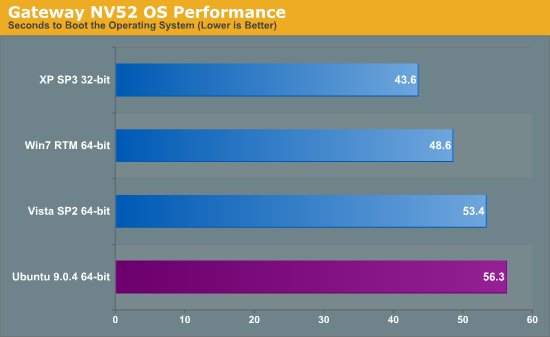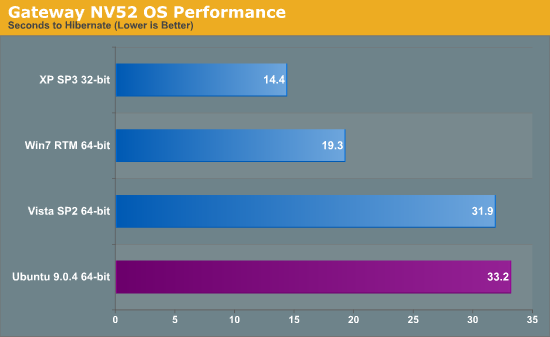Gateway NV52 (AMD) - OS Benchmarks
The final aspect of operating system performance we want to look at involves common OS tasks. We measure how long it takes to perform the routine operations of booting, shutting down, hibernating, resuming, suspending, and waking your computer using the four test operating systems. Unlike other test results, there was a huge degree of variability in some of the tests. We ran each test at least five times, and we took the best result - the reason being that some of the results were completely out of line with the average result, so including one or two results where the system took four times as long it didn't seem logical. Ubuntu and Windows 7 didn't show as much variation as XP and Vista, particularly in the sleep/wake testing, but the hibernate/resume test once again varies quite a bit between test runs.
The variability remained even after following a relatively straightforward test procedure. First we booted each laptop using the test OS (timing how long it took). Then we let the system stabilize for at least 15 minutes, with no extra applications running and the system sitting idle at the desktop. Finally, we performed one of the other tests - shut down, hibernate/resume, or sleep/wake. Obviously, you can't test resume time without first hibernating, and you can't test wake time without first putting the system to sleep, but otherwise we made sure to shut down the system between test runs.
We also need to mention that Windows XP has an inherent advantage in the hibernate/resume testing because we are using a 32-bit OS instead of a 64-bit OS. That means the system doesn't make use of all 4GB of memory, and the hibernation file is 3GB. Writing 3GB of data will obviously be easier than writing 4GB of data, especially when you're dealing with a 5400 RPM laptop hard drive.


The results are rather scattered this time, with certain functions favoring one OS and others looking better on a different OS. Boot times favor Windows XP, followed by Windows 7 which takes 11% longer. Vista trails Windows 7 by 10%, and Ubuntu brings up the rear at 5% longer than Vista. Shutdown times are a different matter, where Ubuntu takes the lead. Vista and Windows 7 are essentially tied, taking 55-60% longer to shut down than Ubuntu. Windows XP brings up the rear this time, at over 2.5 times as long as Ubuntu, although we have to say that this appears to be a driver issue as the result for the NV58 is radically different. When you shut down Windows XP on the NV52, there's a delay of about 15 seconds where there is no apparent activity, after which the hard drive activity light begins blinking. It would seem that without that handicap, Windows XP would be roughly the same as Vista and Windows 7.


As already stated, Windows XP 32-bit has an advantage for the hibernate/resume testing because it doesn't have as much addressable RAM. It ends up walking away with the hibernate/resume performance crown, followed by Windows 7. That said, the time to hibernate in Windows 7 is 34% longer than Windows XP and resume time is 32% longer; Win7 has 33% more memory, so a 32-bit version of Windows 7 ought to be as fast as Windows XP (or a 64-bit XP as slow as Win7). The gap between Windows 7 and Windows Vista is extremely large for hibernation time, with Vista taking 65% longer to hibernate and 46% longer to resume. Ubuntu is almost tied with Vista on the hibernation time, but it takes 50% longer to resume - about twice as long as Win7 - making it by far the slowest OS for this particular test.
We need to take a moment to discuss boot times and resume times, however, as there's more going on than meets the eye. When booting or resuming a system, the computer needs to perform a Power On Self Test (POST). That takes around nine seconds on these Gateway systems, and once that's complete the boot loader is activated which then loads the OS. Ubuntu uses GRUB and that appears to add an extra ~10 seconds relative to Windows. Without that time penalty, Ubuntu would be far more competitive in boot time (about equal to Win7), although it would still be in last place in the resume test. There are also laptops that have a fast boot feature so that they don't perform a lengthy POST, which can shave another 6 or 7 seconds off the boot/resume times. This is definitely a feature we would like to see implemented on more systems going forward, particularly laptops where users routinely boot or resume several times per day.


Wrapping up the OS performance analysis, the sleep/wake times were highly variable on the Windows XP and Vista operating systems. This is especially true if you put the system to sleep right after waking it up, booting, resuming, or any other complex task; in those cases, it might take over a minute to go back to sleep. Ouch! It may also take over 20 seconds for Windows to go to sleep if you have a bunch of applications open - that's about six times as long to put your laptop to sleep, which can be very annoying if you just want to pack up and go. You might think that you can just put your system to sleep and throw it in its bag and walk off, but sometimes a glitch will prevent a laptop from going to sleep so we like to make sure our laptops actually shut off before putting them in an enclosed space. We have heard of a few instances where a laptop has apparently overheated because it didn't go to sleep and a user put it in a laptop bag, resulting in a dead system. That's some food for thought anyway. Ubuntu and Windows 7 did a lot better, with the worst-case result being around twice as long as the best time.
Sleep times are a tie between Ubuntu, XP, and 7 at just under 5 seconds. Vista took noticeably longer even in our best-case result, trailing XP by 59%. Wake times mix things up quite a bit and show a lot less variation between runs, with Ubuntu falling to dead last and Vista and 7 essentially tied at ~3.5 seconds. XP takes 46% longer than Vista to wake and Ubuntu is 55% longer than XP (over twice as long as Win7). Again, though, variability in sleep times makes us prefer Windows 7 and Ubuntu followed by XP, with Vista being the worst at consistently going to sleep without a large delay.










106 Comments
View All Comments
JarredWalton - Monday, September 21, 2009 - link
Links please? I'm not a Linux guru by any stretch of the imagination, so if there's a "better" Linux option out there for testing I'm willing to give it a look. Ideally, I need something similar for the AMD platform.prince34 - Monday, September 21, 2009 - link
You could always look a UNR(Ubuntu Netbook Remix) as a netbook distro. It's what I use on mine. I've done some comparisons to XP on it, and it seems to follow the trends you are seeing, but not with as much disparity.http://www.ubuntu.com/GetUbuntu/download-netbook">http://www.ubuntu.com/GetUbuntu/download-netbook
smitty3268 - Monday, September 21, 2009 - link
I'm not sure Moblin is really a "mainstream" linux option at this point, it's more of an Intel "look at what we can do on netbooks" research project. It does supposedly have 5 second boot times. I suspect your tests here are almost completely dependent on the browser and Flash anyway, and the video drivers. All areas that Linux does not excel at - battery and performance testing of Linux + Apache or file serving would no doubt be much better.http://moblin.org/downloads">http://moblin.org/downloads, if you really want to try it.
smitty3268 - Monday, September 21, 2009 - link
Or the LiveCD version: http://moblin.org/documentation/test-drive-moblin">http://moblin.org/documentation/test-drive-moblinsmitty3268 - Monday, September 21, 2009 - link
Firefox for Linux is well known to be terribly slow and unoptimized compared to the Windows version. It would be interesting to see the battery results from running the Windows version through WINE on Ubuntu, just to see how that compares - I know it blows the Linux native version away as far as javascript performance is concerned, and I'm sure Flash is the same. You could also try Chrome, since I've heard it works quite fast, even though it's still in beta.Chlorus - Monday, September 21, 2009 - link
But how could that happen? I thought Linux was the most awesome OS ever? All the people on slashdot said so! Are you saying they lied? M$ SHILL!!!smitty3268 - Tuesday, September 22, 2009 - link
If you read what I was saying, it doesn't have anything to do with linux, it's a Firefox problem. They've got performance bug reports that say, "fixed, for windows. we could do this for linux but not worth the effort." They don't even enable profiled compilation, which is good for a 10-15% boost on windows.smitty3268 - Monday, September 21, 2009 - link
Also, Ubuntu 9.04 (and other distros released last spring) had a terrible, terrible regression with Intel video driver performance. I'm not sure how much that really affects battery life, but it definitely could. Something to keep in mind, anyway, as you compare the differences between the two laptops.andrewaggb - Tuesday, September 22, 2009 - link
It's true about the intel driver, but let's be honest, if it wasn't the graphics driver it'd be pulse audio, or using 64 bit instead of 32 bit firefox, ext4 whatever... Seems linux get's alot of excuses for it's problems.I'm pretty tired of ubuntu and fedora. Releasing half-finished, barely tested, OS's to the masses is not doing linux a favour, but as the answer to everything is it's fixed in svn... you're kinda stuck.
JarredWalton - Monday, September 21, 2009 - link
I followed a guide on fixing Intel GPU performance in Ubuntu... I don't know if it really worked or not, but here's the reference:http://ubuntuforums.org/showthread.php?t=1130582">Jaunty with Intel Performance Guide. I stayed with the default kernel and the "Safe" configuration, which may be partly to blame for suboptimal results. Then again, the ATI platform fared worse under Jaunty.